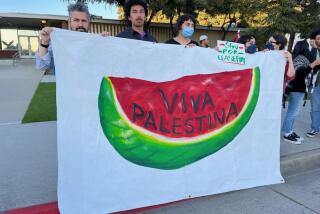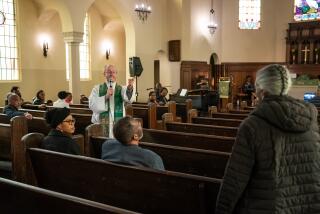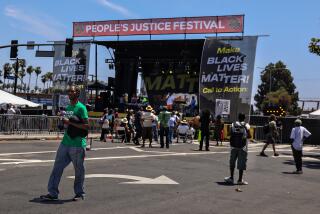Latino activists push for solidarity with Black community as they confront racism
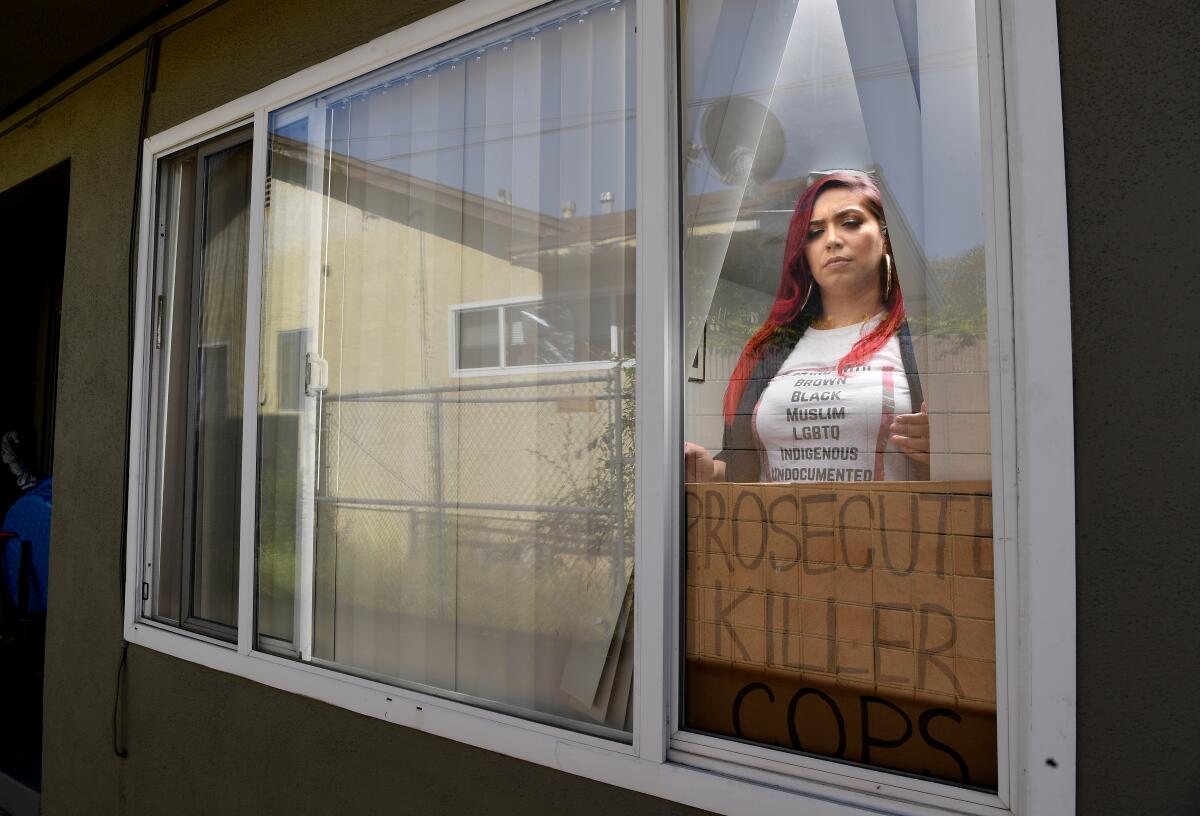
For 28-year-old pastor Rene Molina, the 20-foot-long Black Lives Matter banners outside Iglesia Restauración in West Adams send an undeniable statement.
“It’s all in,” he said.
When the George Floyd protests began in late May, Molina read Black philosophers and theologians like Cornel West and James Cone. He gave sermons about how the Bible supports the oppressed.
That didn’t feel like enough, so he and others decided that their 2,500-member Latino church would display the two banners. When they disappeared, the church replaced them with larger ones.
“I think a lot of the Hispanic activists, we view the Black community … as trailblazers,” Molina said. “We see them when they speak out. We find ourselves in their voice. When they express their anger, we can relate to that. When they express the pain, we can relate to that.”
The protests and calls for police reform have drawn widespread multicultural backing, including from Los Angeles’ Latino community. Many Latino activists have sought to create understanding for Black Lives Matter within their community by emphasizing the societal inequalities both groups face and how their prosperity is tied.
They also have strove to address anti-Black attitudes within Latino culture, but say that bridging a gap that often reflects generational divides can be complicated.
Molina has faced a disconnect with his parents, his church’s senior pastors and immigrants from El Salvador and Guatemala. He said that they, like many other first-generation immigrants, struggle to view police brutality against Black people as a systemic issue.
But they haven’t stopped his activism. Molina has organized events with Greater Zion Church Family, a Black church in Compton, where pastors and elected officials spoke about Black Lives Matter.
“They’ve taken the back seat of support and they’ve allowed the millennials to take the driver’s seat,” he said of his parents.
Gaspar Rivera-Salgado, a labor studies professor at UCLA, also noted that Latino support for the movement often reflects a generational divide. Many first-generation adult immigrants, he said, bring with them racist attitudes from the legacy of colonialism in Latin America that are less embedded among U.S.-born Latinos.
“The Latino community is very big, but there is a sizable sector, especially U.S.-born Latinos, squarely supporting this moment, and they are talking to the older generations about the importance of having racial consciousness,” he said.
Fernando Guerra, director of the Thomas and Dorothy Leavey Center for the Study of Los Angeles at Loyola Marymount University, said that L.A.’s Latino and Black communities may be viewed as natural allies because they suffer deep economic and health inequities.
Latino and Black people have been hit harder by the coronavirus, facing about double the mortality rate in L.A. County than that of white residents. They also have been heavily affected by police violence. In L.A. County, nearly 80% of people who have been killed by local police since 2000 have been Black or Latino. (Black people make up 8% of the county’s population, yet they represent a quarter of law enforcement killings. Latino people make up 49% of the population and represent 53% of the killings.)
The desegregation of neighborhoods, Guerra said, has also tied the future of both groups together.
“When you say, let’s invest in black neighborhoods, there is no such thing anymore,” he said. “Yes, segregation exists, but if you invest in Compton, that’s a Latino city. A great infusion in economic development in what are traditional Black neighborhoods will benefit Latinos as well.”
Saul Sarabia, a consultant on racial justice who previously directed the Critical Race Studies program at UCLA’s law school, said that the Latino community’s participation in L.A.’s George Floyd protests partly reflects years of coalition building between Black and Latino people. Los Angeles now has a rich landscape of community-based Black and Latino coalitions working together on criminal justice issues, like jail reform and reentry services.
“The support of brown folks could be plugged into something very concrete,” he said. “These are not new demands and they’re not just Black demands.”
Carlos Montes, a co-founder of the Brown Berets, a group that emerged during the Chicano movement, said that as an activist in Los Angeles he had always advocated partnering with Black organizations, which showed support for Chicano activists during the 1968 East L.A. student walkouts.
In June, Montes participated in a youth-led series of actions to support Black Lives Matter in the predominantly Latino Boyle Heights neighborhood. They included a vigil at Mariachi Plaza, and that same night Montes attended a protest outside the LAPD Newton station to demand justice for the families of Latino men killed by police.
“We spoke about the need for Black and brown unity,” Montes said. “We always bring that theme up. Support Black Lives Matter and denounce the killings of Black and brown [people].”
Some Latino activists who supported Black Lives Matter say they’re motivated by the racism in their own culture. They recall relatives who praised light-skinned babies over darker-skinned ones and phrases like “mejorar la raza,” a popular saying that implies one should “improve the race” by having lighter-skinned children.
Brenda Navarro, a 30-year-old attorney at CARECEN, a local Central American immigrant rights organization, has seen her privilege as a light-skinned Latina “play time after time in my own life.”
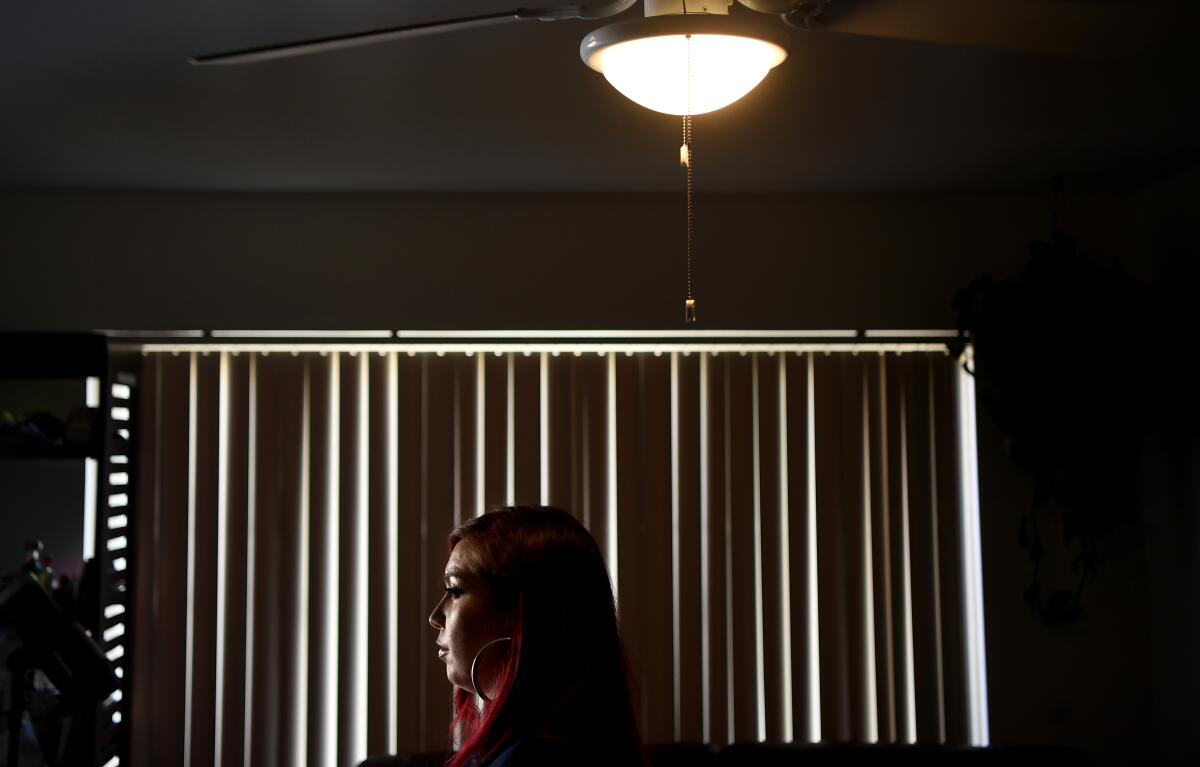
An early childhood memory shaped this awareness. Security guards in an L.A. County shopping mall once surrounded her dark-skinned Mexican grandfather when they heard Navarro crying in his arms. They accused him of kidnapping Navarro, who calls herself “white passing.”
Later on, her grandfather would tell her, “Mamacita, try not to date someone who looks like me because they discriminate against people like me a lot.’”
“My skin color, my eye color, my hair color is highly favored, and for that reason alone, I’ve been given so many advantages,” Navarro said. “Understanding my own privilege has really helped me understand how my privilege is based on the oppression of others.”
Navarro has sought to explain to Latino acquaintances that the Latino community also faces police brutality, so that they can see that “this is our struggle too.”
She’s working with others including Keana Moody, an Afro-Latina citizenship instructor at CARECEN on a project to distribute educational material to help address anti-Black attitudes among Latinos.
Moody, 25, said the movement has pushed forward conversations that “should have been happening a long time ago, especially with the Latino community.” She recalled a moment in a citizenship class when a lighter-skinned Mexican student said that in his 30 years in the U.S. he had never had trouble with the police, claiming that those who do “are doing something bad and they deserve it.”
A dark-skinned student from Honduras disagreed, recounting how a police officer had once pulled him over for a traffic infraction, forced him out of the car and twisted his shoulder while he screamed in pain.
Biracial Black Lives Matter members also have used their identity to help their cause resonate with Latinos. La Mikia Castillo, an activist who does antibias consulting, has grandparents who immigrated from Panama; she identifies as Afro-Latina.
During a virtual forum with a South Bay Latino church a few weeks ago, a person asked her why the Black Lives Matter movement’s slogan doesn’t instead emphasize how all lives matter. She responded by drawing a parallel to immigrant rights issues.
“If your family is being separated at the border and someone comes and says something like, ‘All families matter’… they’re diverting attention from the issue at the border or from issues that your community is facing,” she said.
Carlos Rincon, a pastor at Centro de Vida Victoriosa, said that the recent protests don’t resonate with many in his evangelical East L.A. church.
“’We pay a high price — some of us even die to cross [the border] just to work — and they [Black people] live here, they have an opportunity, they speak the language, I don’t know why they’re complaining,’” he said some have remarked.
He has tried to broach the topic by giving sermons that have incorporated the history of slavery, Jim Crow laws and redlining, explaining that although discrimination is illegal, systemic racism still exists. He also turns to biblical stories, because if he deviates too much from religious topics, congregants may accuse him of getting political. Everyone is created in God’s image and no one knows what skin color Jesus had, he has told them.
“What I’ve tried to say from the stand is this is a moment of pain for the African community, and as followers of Christ we should be good Samaritans right now,” Rincon said. “Making them understand this is a time for us — Hispanics or immigrants — to be in support.”
More to Read
Start your day right
Sign up for Essential California for news, features and recommendations from the L.A. Times and beyond in your inbox six days a week.
You may occasionally receive promotional content from the Los Angeles Times.
